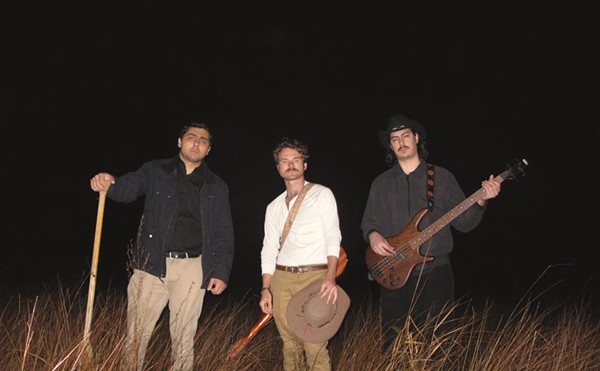Perhaps one day, when the current generation of "No Depression" readers is a little closer to its dotage, some entrepreneurial group will start up an alt-country version of Branson, Mo. They could fix up a few neat old buildings in some town somewhere and invite almost-forgotten ex-insurgent singers and pickers to leave their workaday lives behind to rehash their could-have-been hits for vacationing droves of the former cheap-clothes-and-good-beer clique, now slathering sunscreen on their tattoos and ordering more decaf as they toe-tap once again.
A few years ago, Robbie Fulks might have been a good bet as a headliner. The man can write a country song in the classic style -- a tuneful, tidy three-verses-cat-chy-chorus-and-a-bridge-for-good-measure structure filled in with straight-talking lyrics that never forget to be clever, no matter how heavy the heartache. Of course, he was alt-country through and through, sardonic and low on the Mickey Mouse. He'd tried his hand in Nashville, but Music Row team players just don't write a fallen-angel tragedy and name it "She Took a Lot of Pills (and Died)."
A smart songwriter's generally no fool, and Fulks, who attended Columbia University, seems smarter than most. As he said in a recent interview posted on his website, www.RobbieFulks.com, "[A] little over three years ago, I was at that place you come to after having codified a reliable technique for the steady production of songs and records: a standstill." After two albums full of alt-country classics for hallowed Chicago indie label Bloodshot, Fulks started trying to dig out of the Brand New Opry rut he'd placed himself into; the darker, moodier and rock-flavored "Let's Kill Saturday Night" (1998) proved a disappointment for many casual fans as well as major label Geffen, for which it was Fulks' first and last effort. The new "Couples in Trouble" (released on his Boon-doggle label) collects Fulks' subsequent attempts to break out of the alt-country ghetto in his career and in his own head.
"In Bristol Town One Bright Day" opens "Couples" with a loam-clumped chunk of roots music, a dead-ringer folk-ballad pastiche where boy meets girl, boy beds girl and it all goes horribly wrong. Thereafter, the album spreads out like a river delta as Fulks tries on anguished singer/ songwriter pop ("Anything for Love" and "I've Got to Tell Myself the Truth"), a jazzy torch tune ("My Tormentor") and barrelhouse oompah ("Brenda's New Stepfather"). There's even an untitled segment of electronic abstraction hidden among the later tracks.
Fulks' songwriting fans out, too, as he follows the theme of the album's title down various paths. "Dancing on the Ashes" finds him first offering up the horrors of a soldier's slog through World War I, then zooming forward three generations to the soldier's video-game-warrior great-grandson "lost ... in a cathode mist." On "Brenda's New Stepfather," he channels a stepdaughter's worst nightmare -- a midnight-creeping horndog who warns, "I've seen your kind sagging like a crone, fucked empty at 25." Snappy, polished country tunes these ain't.
Perhaps the best song is the simplest, "She Needs You Now." A delicate big-sky ballad that billows with Fulks' reedy tenor, it shadows a couple driving to a funeral -- her distraught, him compassionate but also secretly thrilled to be her rock. "Couples" makes it plain that Fulks is a songwriter of enormous talent, but the album ends up much easier to admire than it is to enjoy. Whether he breaks out of alt-country or not, that may be where he ultimately sounds best.
Like Fulks, Berklee School of Music-educated Gillian Welch is best-known for her authentic revisiting of a decades-old style. The finest of her ersatz mountain airs are so grave and graceful they sound as if some stubborn folklorist just pluck-ed them from the last sunless Appalachian holler. T-Bone Burnett's inexplicably mannered production on 1996's "Revival" and 1998's "Hell Among the Yearlings" didn't help, making Welch's tunes sound as stiff as dried-out relics.
Well, the snapshot that adorns her new CD, "Time (The Revelator)," is in living color, and Burnett has gone the way of black-and-white as well. Welch's co-writer, harmony singer, guitarist and husband, David Rawlings, produced, booking the twosome into an old-school Nashville studio where they sat down in front of a few mikes and sang their songs live, not unlike the Carter Family did in its time. In a way, it's a step back, but it helps make "Time" Welch's great leap forward.
The intimate setting makes Welch's voice come alive as it never has on record before. She sounds sprightly as she em-braces good old country dirt on "Red Clay Halo." She even sounds slyly sultry on "My First Lover." (Gillian Welch gets laid!) Nonetheless, the real fireworks come from the way the duo's voices bloom together in the pared-down mix. Welch's lead and Rawlings' unobtrusive yet ever-present harmony ghost and wheel around each other like courting swallows, turning even a slight genre exercise like sleepy-time love song "Dear Someone" into a lilting treasure.
The songwriting on "Time" represents every bit as much of an experiment as the writing on "Couples in Trouble," with more promising results. Where Fulks ditched one set of genre rules only to settle for others, Welch throws her pressed-flower revivalist pose right out the window. The stately "April the 14th Part I" shuffles snapshots of events that took place on the title day, from the sinking of the Titanic to Lincoln stopping Booth's bullet to a woman passed out in the back of a car in a bar parking lot. Three tracks later, she recasts the same litany (minus the mystery woman) as a country blues for "Rumination Day Part 2." Why? Who knows, but it's downright hypnotic.
Unfortunately, she brings folk hero John Henry into it, and it's not the only odd tangent or anachronistic misstep on "Time." The gorgeous, fatalistic ballad "Everything Is Free" turns out to be about Napster: "I could get a tip jar/ gas up the car/ try to make a little change/ down at the bar," she sings, as if she's recounting a mine disaster. Frankly, the song makes her sound like the po-faced Luddite her image hints at. But "Time"'s biggest revelation may be that there's a genuine living, breathing 21st-century artist behind that dusty facade, with a bigger-than-retro career in store.
















